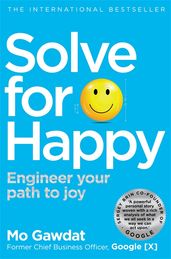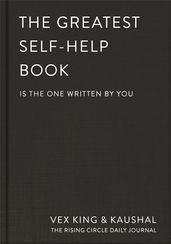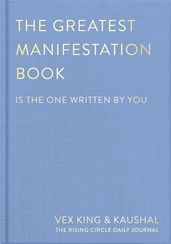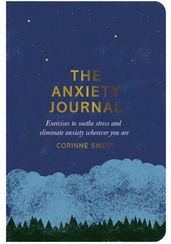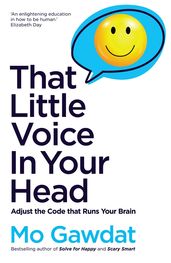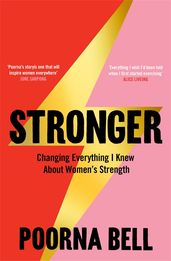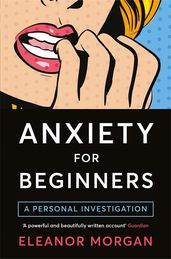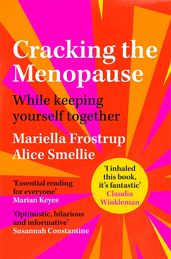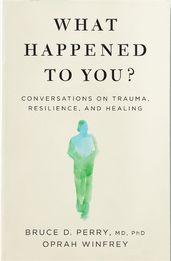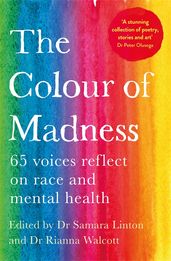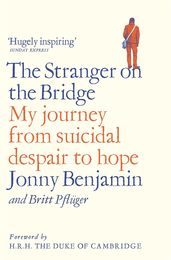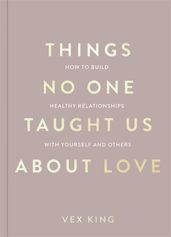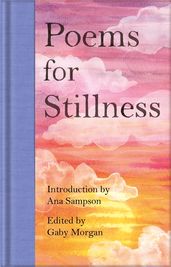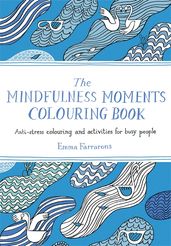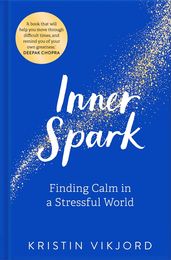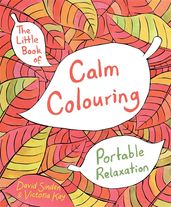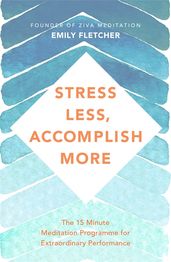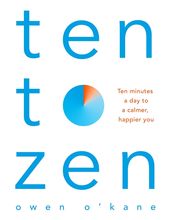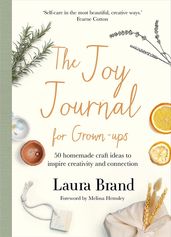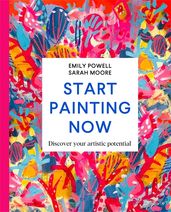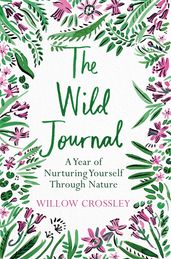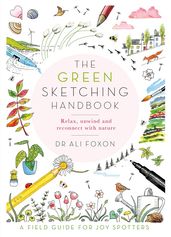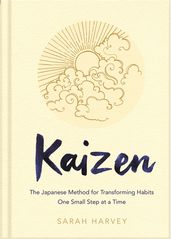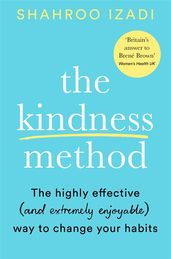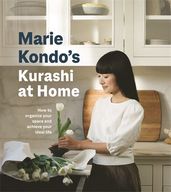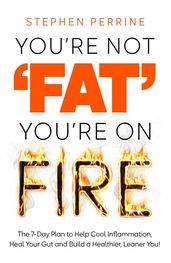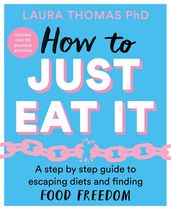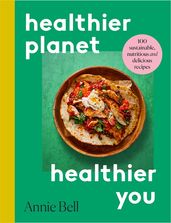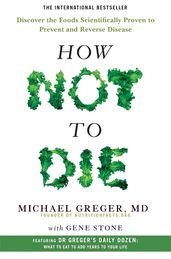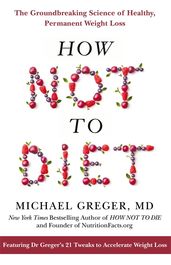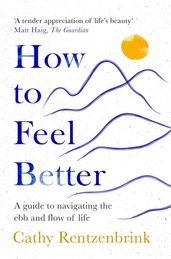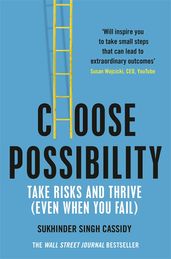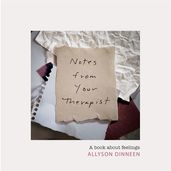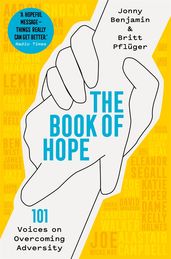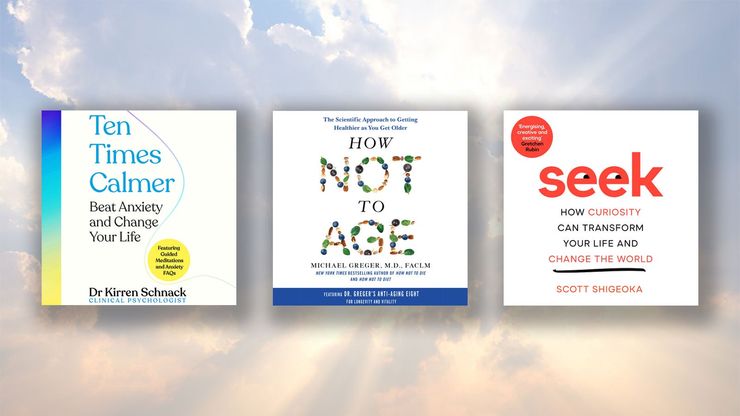The best self-care and self-help books to read right now
Our edit of the best self-care and self-help books to draw insight, comfort and inspiration from.
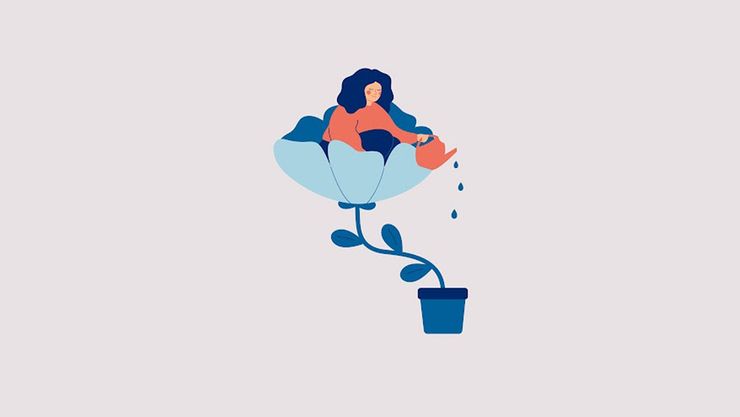
Self-care can mean many different things to different people. For some, it could be taking mindful moments in a stressful day. For others, it may mean investing time in yourself, exploring your creativity, or challenging your thought patterns. Here, we've curated our edit of the best self-help books to draw comfort and inspiration from, whatever your goals.
The best self-care books about mental health and wellbeing
Tools for Life
by Kirren Schnack
Dr Kirren Schnack outlines ten essential therapeutic skills you need to know in order to embrace the life you want and deserve. Dr Kirren shares powerful ways to understand yourself: how your attachment style, childhood, trauma and personality shape the way you think, feel, and relate. Her practical tools will help you understand why you feel stuck, stop people-pleasing, build healthy boundaries and heal past pain. Discover how to live with clarity, confidence and balance.
Stress Tested
by Dr Richard Mackenzie
Stress Tested combines cutting-edge research with real-life case studies to explore how chronic stress influences factors such as weight, type 2 diabetes, fertility, and early childhood development. Packed with enlightening insights – like the surprising effects of low-carb diets and high-intensity exercise on cortisol levels – the book offers practical strategies for managing stress and mitigating its long-term health consequences. Written by leading researcher Dr. Richard Mackenzie and journalist Peter Walker, this essential read empowers individuals to understand and navigate the complexities of stress in today's fast-paced world.
Unstressable
by Mo Gawdat
From the bestselling author of Solve For Happy comes Unstressable, a guide for how to stop stress from ruling your life. Written with stress management expert Alice Law, in Unstressable Mo Gawdat shares his own experiences with stress, how he learned to predict stressful times and his strategies for managing negative thought patterns. With practical, actionable exercises that will help you manage the pressures of everyday life, this book will help you break out of the cycle of chronic stress and take control of your mental wellbeing.
Ten Times Calmer
by Kirren Schnack
Dr Kirren Schnack is here to tell you that your anxiety isn’t here to stay. As an Oxford trained and practicing NHS clinical psychologist with twenty years’ experience, she offers a first aid kit of tools to help you understand what you’re going through and change how you’re feeling – and it might just be easier than you think. The ten chapters cover everything from dealing with anxious thoughts and stress to managing uncertainty and safely tackling trauma, with each tip taking you one step closer to an anxiety-free life.
Solve for Happy
by Mo Gawdat
Written by a top Google executive, Solve For Happy is about creating and maintaining happiness. In 2001 Mo Gawdat realised he was incredibly successful, but desperately unhappy. He committed to solving the problem like the engineer he was, examining the facts and following logic. Ten years later his research saved him when his son Ali died during routine surgery, and he realised his mission was to share his Happiness Equation with the world.
‘Mo Gawdat is my life guru. His writing, his ideas and his generosity in sharing them has changed my life for the better in so many ways. Everything he writes is an enlightening education in how to be human.’
— Elizabeth Day on Mo Gawdat
The Greatest Self-Help Book (is the one written by you)
by Vex King
From Sunday Times bestselling author of Good Vibes, Good Life and Healing is the New High, Vex King and social media star Kaushal, this is a journal like no other. Filled with exercises, activities and visual prompts, it will help you to understand and regulate your emotions, maintain habits that work for you, shift negative mindsets and cultivate positive thought patterns, build self-awareness and carve out time to practise self-love and gratitude. Think of this as your companion to help you build a healthier relationship with yourself and others; The Greatest Self-Help Book is the one written by you.
The Greatest Manifestation Book (is the one written by you)
by Vex King
Unlock your inner power, create positive change and bring about the life you truly desire with The Greatest Manifestation Book. This journal will help you to understand what manifestation is, how to set intentions and goals, overcome limiting beliefs, practise daily gratitude, and ultimately lead the life you’ve always dreamed of. Each day, you will have the opportunity to speak aloud a powerful affirmation, dig deep with a gratitude prompt, rewrite your ‘manifesto’, work on negative thought patterns, develop self-awareness and engage with some interactive activities to aid your journey.
The Anxiety Journal
by Corinne Sweet
Many of us are probably feeling a little more anxious than usual right now. The Anxiety Journal encourages you to use CBT techniques and mindfulness exercises to better understand your anxiety and achieve peace and calm. Practical, supportive and uplifting, this is a self-help journal for anyone who struggles with anxiety, whether in the form of phobias, social anxiety, generalized anxiety (GAD) or day-to-day worrying.
That Little Voice In Your Head
by Mo Gawdat
Retrain your brain with this practical guide by former Google engineer and executive Mo Gawdat, author of international bestseller Solve for Happy. Gawdat teaches how we can conquer negative thoughts, change our thinking processes, turn avarice into generosity, transform lethargy into empathy and invest in our own wellbeing and happiness. With exercises and personal insights, That Little Voice in Your Head can move us away from the misconceptions of modern life.
Stronger
by Poorna Bell
Have you ever worried that you're not enough, or that, if you were stronger or more confident you would achieve more? In Stronger, award-winning journalist and competitive amateur powerlifter Poorna Bell investigates and unveils the potential that women can unlock when they realise their strength – both physical, and mental. Through examining her own experiences, as well as those of dozens of women, Bell shows how finding strength can work for you, regardless of your age, ability or background, and offers actionable ways for your to harness it in your life.
Anxiety for Beginners
by Eleanor Morgan
Eleanor Morgan offers an insight into the often crippling effects of anxiety disorders, her book serving as a guide for those living with anxiety and for people who have friends or family who suffer. Eleanor combines her own experience with expert research to investigate what contributes to so many of us suffering around the world. Anxiety for Beginners is, at its heart, a book about acceptance, as Morgan discovers the ways in which people can live a life that is not just manageable but enjoyable, learning to accept anxiety as part of who we are rather than spending a life fighting and being ashamed of it.
Cracking the Menopause
by Mariella Frostrup
It's time to start talking about the menopause. In Cracking the Menopause, journalist and broadcaster Mariella Frostrup and health writer Alice Smellie are determined to bring the subject to light. Writing with humour and honesty, they share their own stories, the latest scientific discoveries and case studies from a variety of women. A rich source of advice and information, with light-hearted illustrations and heartfelt testimonies.
What Happened To You?
by Oprah Winfrey
In this new self-help book Oprah Winfrey and world-renowned brain development and trauma expert Dr. Bruce Perry examine the impact that our early childhood experiences – both good and bad - have on who we are as people. Shifting the question from 'what's wrong with you?' to 'what happened to you?' this self-help book examines people and their behaviour through the context of their personal experiences. Grounded in the latest brain science and brought to life through compelling narratives, What Happened To You? offers a beacon of hope for those looking to recover and transform after adversity.
The Colour of Madness
by Samara Linton
The Colour of Madness brings together memoirs, essays, poetry, short fiction and artworks by people of colour who have experienced difficulties with mental health. From experiencing micro-aggressions to bias, and stigma to religious and cultural issues, people of colour have to fight harder than others to be heard and helped. Statistics show that people from Black and minority ethnic backgrounds in the UK experience poor mental health treatment in comparison to their white counterparts, and are more likely to be held under the Mental Health Act. For more inspiring reads take a look at our our top books about mental health.
The Stranger on the Bridge
by Jonny Benjamin
In 2008, Jonny Benjamin stood on Waterloo Bridge, planning to jump, until a stranger stopped to talk to him. That stranger saved Jonny’s life. In his candid memoir, Jonny tells the story of how he got to the bridge in the first place, how he continues to manage his diagnosis of schizoaffective disorder, as well as what happened when he tried to find the stranger who helped him, six years later. The Stranger on the Bridge is a book about second chances and the power of connection.
Self-care books about relationships
The Power of Parting
by Eamon Dolan
Family estrangement can be a tragedy. But in The Power of Parting, Eamon Dolan combines research and memoir to show it can also be an empowering solution. He draws on his personal experience of severing ties with his abusive mother and discusses the emotional and societal challenges that came with this decision. The Power of Parting is a vital resource for those seeking to understand or navigate the path of distancing from toxic family relationships, offering compassionate guidance on setting boundaries, coping with guilt, and finding personal liberation.
Things No One Taught Us About Love
by Vex King
The hope and expectation that romantic love can and will be the solution to all our problems can put real strain on our relationships. Learn how to strengthen them, and uncover the true nature of love – a force within us, rather than an external power – with Vex King. By deconstructing the myths and misconceptions surrounding love and relationships, this book will help you to understand yourself, create and maintain healthy habits, set boundaries and heal.
‘I have always believed in the idea that people inspire people. I know what's what inspired me... and Vex really is the ultimate example of that.’
— Deliciously Ella on Vex King
The Power of Words
by Mariano Sigman
Learn how you can make your conversations more present, productive and powerful in The Power of Words, the new book from neuroscientist Mariano Sigman. By focussing not on our conversations, but upon the meanings of the words we use, Sigman explains how choosing the words we use to describe ourselves and those around us can help us improve our relationships, our decisions and our actions. With exercises to help you examine your relationship with language, this book is packed with practical ideas to help you become a more effective communicator with everyone in your life.
Loving Me After We
by Ginger Dean
A break up doesn't have to be the end, it can be the start of a new, better you. This is your essential handbook to breaking up with toxic relationships for good, healing from past traumas and moving towards a more joyful future. Psychotherapist Ginger Dean will show you how to break out of toxic cycles and break free from co-dependency, and move on to a future where you can genuinely thrive.
The Shift
by Tinx
Lifestyle creator, advice expert and podcast host, Tinx, collects all her revolutionary theories and hilarious personal anecdotes in one place to create a guide to dating, self-worth and becoming the main character of your life. She shows us how simple mindset shifts can completely change the way you approach decision making and relationships, turning dating into a process of self-discovery rather than just a means to an end. Packed with the signature wit and honesty that Tinx's TikTok followers know so well, The Shift helps us to step into our confidence, and enjoy the journey along the way.
To My Sisters
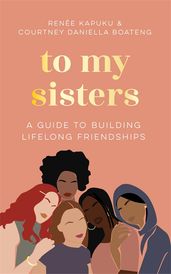
From the hosts of the hit podcast, To My Sisters, comes this essential guide to sisterhood. Old friends Renee Kapuku and Courtney Daniella Boateng are united in one mission - reinvigorate and redefine sisterhood to inspire a global community of women to uplift each other and reclaim their power. They argue that unconditional love is too often limited to parents or spouses, when actually embracing the power of friendship and community in an authentic pay is just as powerful. Packed with practical advice, reflective activities and wise words,To My Sisters will teach you how to find, build and nourish lifelong friendships.
The best mindfulness self-care books
Deep Meaningful Conversations with Myself
by Vex King
This six-month daily journal allows you to dive deeper with journaling and gives you the tools to find your truth and discover your authentic self. With space to share your daily affirmations, release everything on your mind and answer thought-provoking questions, you’ll be able to refine your core values, explore your boundaries and make mindful choices.
Poems for Stillness
by Gaby Morgan
Arranged around themes of meditation, friendship, gratitude, prayers and wellbeing, stillness and consolation, this stunning poetry anthology is tailored to create calm and peacefulness. Including poems from Shakespeare, Yeats, Mansfield, Wordsworth and more, as well as uplifting prayers and blessings from around the world, this collection will transport you from moments of chaos to stillness. Part of the Macmillan Collector's Library with a beautiful cover and the signature ribbon marker, this is the perfect gift for any books lover – or for yourself.
The Mindfulness Moments Colouring Book
by Emma Farrarons
This gorgeous colouring book is full of ideas for mindfulness activities and exercises which draw on your creativity and hone your focus. It’s perfectly pocket-sized, so you can colour your way to peace and calm wherever you are.
Inner Spark
by Kristin Vikjord
Kristin Vikjord’s self-help guide draws on her experiences as a clinical psychologist, yoga teacher and mindfulness facilitator to help readers to embrace the challenges of modern life. Offering a practical toolkit of exercises to help you find and nurture your inner spark, Kristin explains how the brain’s pathways work, and how and why it is so important for anyone having a difficult time to have a toolkit for reconnection. Kirsten guides the reader through three sections of the book: normalisation, clarification and agency with the mind of a clinical psychologist and the heart and soul of a yoga teacher.
The Little Book of Calm Colouring
by David Sinden
Soothe stresses away and lose yourself in some creative colouring with this beautifully hand-illustrated colouring book full of stunning anti-stress designs and inspiring quotations.
Stress Less, Accomplish More
by Emily Fletcher
Emily Fletcher is a leading expert in meditation for high performance, and in Stress Less, Accomplish More, she shares an ancient meditation technique to relieve stress, clear your mind and increase productivity. Designed for busy lives, all you need is somewhere to sit, a little training and some time to yourself. This book has a very simple message: do less – without the stress – and accomplish more.
Ten to Zen
by Owen O'Kane
This simple but effective self-help book helps to get you in the right headspace for challenging times in just ten minutes a day. Using four therapeutic models – mindfulness, cognitive behavioural therapy (CBT), psychotherapy and eye movement desensitization and reprocessing (EMDR) therapy – you will learn how to settle your mind quickly, retrain your brain to deal with stress and restructure unhelpful patterns of thinking.
Creative self-care books
The Joy Journal for Grown-ups
by Laura Brand
The Joy Journal for Grown-ups invites you to experiment, play and unlock your creative potential with a range of simple crafts that can bring a little more calm into your everyday life. Using store-cupboard ingredients and easily foraged supplies, this beautifully illustrated handbook includes new and inspiring ideas for adding a personal touch to celebrations, creating unique gifts, and making stunning keepsakes. Imaginative, engaging and easy to follow, this gorgeous, step-by-step guide features all the encouragement you need to find inspiration, awaken your creativity and brighten your mood.
‘This book is a chance to slow down and find stillness. Self-care in the most beautiful, creative ways.’
— Fearne Cotton on The Joy Journal for Grown Ups
Start Painting Now
by Emily Powell
This playful and practical handbook will connect you to the artist within, and foster your creativity. Instagram star artist Emily Powell and her sister, doctor Sarah Moore, are your guides to ignoring the inner critic and finding relaxation and meaning through painting. Start Painting Now comes with examples of Emily and Sarah’s work, as well as inspiration from a range of women artists.
Colouring books for adults
Self-care books to help you connect with nature
The Wild Journal
by Willow Crossley
Willow Crossley’s beautifully illustrated guide celebrates the potential of nature to mend, heal and transform our mood. Full of creative, practical projects, simple habits, small seasonal changes and therapeutic reflections, the book can help counteract the unpredictability and chaos of everyday life.
The Green Sketching Handbook
by Ali Foxon
Inspired by her own journey from climate scientist who hadn't tried drawing since childhood to artist and nature lover, Dr Ali Foxon will show you how to embrace your wobbly lines, unhook from a fear of criticism and create a habit that makes you feel good, not inadequate. You will learn more about yourself and your unique relationship with nature, finding out what brings you comfort and joy. Best of all, you'll create vivid and evocative memories of all your outdoor adventures, big and small, even if you’re convinced you can’t draw.
Self-care books to help you cultivate better habits
Why We Drink Too Much
by Charles Knowles
Ever wondered why that one glass of wine so easily turns into a bottle? Or why you, a perfectly rational person in all other areas of your life, can't seem to resist ‘just one more’? Or why some people aren’t interested in alcohol at all? Forget willpower, advertising and moral weakness – surgeon and clinical research director Charles Knowles, reveals how the surprising truth about our drinking is rooted in ancient biology and brain chemistry. He unpacks how we learn to drink, the brain’s powerful reward system, and the facts about alcohol and health to show what really happens in our brains and bodies when we drink. It's the conversation about alcohol you've been waiting to have – one that is smart, witty and might just change how you think about drinking forever.
Smartphone Nation
by Kaitlyn Regehr
Worried about how much time you spend on your phone? Tired of your attention being the product tech companies sell to advertisers? Digital literacy expert Dr Kaitlyn Regehr offers a vital guide to navigating the digital world with confidence and control. Packed with practical tips and evidence-based strategies, this book helps you understand the impact of smartphones on everything from body image and advertising to misinformation and online safety. Learn how to game your algorithm, limit targeted ads, and improve your digital habits. Perfect for anyone feeling overwhelmed by their devices, this empowering book shows how to embrace the benefits of technology while protecting yourself from its pitfalls.
How to Winter
by Kari Leibowitz
Get ahead of the winter slump with this expert guide from winter psychology mindset expert Kari Leibowitz. Learn how to reframe negative thoughts on the darker days and take the reins on your mental health. With science-backed strategies not just to conquer the cold but any emotional adversities you may stumble upon, Kari draws upon her extensive PhD research and various cultural perspectives to give practical and easy-to-follow tips that you can immediately implement in your daily routine. This is a must-have guide to replacing a dread of winter with an appreciation of each day as it comes.
One Day One Moment
by Vex King
This daily mindful planner helps you reach your professional goals without sacrificing your wellbeing. Learn effective planning techniques, set a Power Hour, utilise the 50-10 method and time blocking, all while tracking your health and taking part in mindful activities. Get ready to embark on your own mindful journey and embrace one day and one moment at a time, for ultimate peace and positivity.
Kaizen
by Sarah Harvey
If you’ve been wanting to cultivate a new habit but life keeps getting in the way, more time spent at home could offer the opportunity you’ve been looking for. Kaizen means ‘change’ ‘good’ – this Japanese philosophy offers a step-by-step method to help you build positive new habits and break bad ones by making small, incremental changes to slowly improve your life. The kaizen method has been adopted by businesses and sports teams all over the world and can be applied to any area of your life, from work and money to exercise and relationships.
The Kindness Method
by Shahroo Izadi
In these difficult times, we could all benefit from showing ourselves a little kindness. If you want to use this time to make a change, Behavioural Change Specialist Shahroo Izadi believes there’s only one way to make change last, and that’s to be kind to yourself. The Kindness Method was developed through a combination of professional training and personal experience and will leave you feeling empowered, positive and ready to make a change, whether it’s weight loss, cutting down on alcohol or improving your relationships.
Kurashi at Home
by Marie Kondo
Over a decade on from the launch of her bestselling book The Life-Changing Magic of Tidying Up, Marie Kondo returns with new wisdom on how to transform your life and home into spaces of calm. This guide introduces the concept of kurashi – meaning way of life – and encourages readers to spend every day in the pursuit of joy, as Marie Kondo shifts her focus from the physical act of tidying towards an even more holistic and personal approach to curating our environments.
The best self-care books to help you reset your relationship with food
You're Not Fat, You're on Fire
by Stephen Perrine
What if there was a scientifically researched way to combat inflammation, improve your gut microbiome and lose weight? If you’re looking for a sustainable way to manage your weight, You’re Not Fat, You’re on Fire is for you. In this revolutionary new book, Stephen Perrine explains how changing your diet can help you combat chronic inflammation, one of the causes of weight gain. Showing how easy it can be to eat thirty different plants each week, the book features delicious, healthy recipes and strategies that will help you lose weight, heal your gut and increase your energy levels.
How to Just Eat It
by Laura Thomas
Nutritionist and bestselling author of Just Eat It Laura Thomas PhD is back with this practical self-help book to help you reframe your approach to food. She uses the principles of intuitive eating in order to develop a judgement-free attitude to food. Laura also helps us to understand and spot diet culture in the media and society. Her wonderful practice called ‘Diet Culture Bullsh*t Bingo’ involves spotting phrases such as ‘burning off food,’ ‘cleanse’ and ‘80/20 rule’ to help understand and learn to identify diet culture (and how it affects us) in everyday life, social media, TV and even our own language.
The Last Diet
by Shahroo Izadi
This self-help book will help you transform your relationship with food and your body, using the same tools Shahroo Izadi used with her clients in addiction treatment, and which helped her lose eight stone in weight. Focusing on the importance of positive self-perception and self-kindness, Shahroo will help you find the motivation to change habits and lose weight for good.
Healthier Planet, Healthier You
by Annie Bell
Inspired by the principles of the Planetary Health Diet, a greener way of eating informed by scientific targets aimed at tackling climate change, nutritionist Annie Bell provides a flexible way of improving your diet, both for the environment and for yourself. Packed with over one hundred recipes, as well as practical tips to reduce food waste, Healthier Planet, Healthier You sheds light on how to eat both sustainably and affordably, without cutting out your favourite treats.
How Not to Die
by Michael Greger MD
The international bestseller, Dr Michael Greger's How Not To Die gives effective, scientifically-proven nutritional advice to prevent our biggest killers – including heart disease, breast cancer, prostate cancer, high blood pressure and diabetes – and reveals the astounding health benefits that simple dietary choices can provide. With emphasis on individual family health history and acknowledging that everyone needs something different, Dr Michael Greger offers practical dietary advice to help you live longer, healthier lives.
How Not to Diet
by Michael Greger MD
Dr Michael Greger, author of the bestselling How Not to Die, offers an easy approach to a healthy, plant-based lifestyle which will help you put an end to dieting and weight-loss struggles. Dr Greger explores the many causes of obesity, and breaks down a variety of approaches to weight loss using cutting-edge dietary research.
Self-care books to read if you want to feel uplifted
The Next Day
by Melinda French Gates
Change is inevitable, but how we face it defines our path forward. In The Next Day, Melinda French Gates offers a deeply personal and insightful look at navigating life’s major transitions. Reflecting on moments of profound change in her own life – including motherhood, loss, and stepping away from the Gates Foundation – she explores how to embrace uncertainty with resilience and clarity. Through thoughtful storytelling and hard-won wisdom, Gates shows that even in life’s most challenging shifts, there is room for growth and renewal. The Next Day is an inspiring companion for anyone standing at a crossroads, ready to move forward with purpose.
How to Feel Better
by Cathy Rentzenbrink
While we can't control all the ups and downs of life, we can choose how we respond to them. But rather than instructing us on how to live, Cathy Rentzenbrink approaches this book with warm, gentle guidance and offers comfort for those times we need it most. She covers topics such as her etiquette for bad news and the words of wisdom she would like to pass onto her son in a characteristically compassionate tone. How to Feel Better is essential reading for anyone looking to make sense of a big upheaval, or those simply navigating the daily ebbs and flows of life.
Choose Possibility
by Sukhinder Singh Cassidy
Sukhinder Singh Cassidy is a high-flying Silicon Valley tech executive but, as she admits, her route to success hasn't been a conventional one. She started three companies, including one designed to place women board members into more companies, but she also encountered failed opportunities and many unexpected obstacles. Her belief is that when people are compelled by fear of missing out – FOMO – rather than FOF – fear of failure – then they become active and open to success, building risk-taking muscle and choosing to act continually rather than making one single choice. If you dream of new opportunities in your work or personal life, this could be the book for you.
Notes From Your Therapist
by Allyson Dinneen
For anyone in need of a daily dose of affirmation and empathy, therapist and mental health counselor Allyson Dinneen shares this collection of artful and beautifully photographed hand-written insights, based on her popular Instagram account @notesfromyourtherapist.
The Book of Hope
by Jonny Benjamin
In this uplifting self-help book, award-winning mental health advocate and author Jonny Benjamin and co-editor Britt Pflüger bring together 101 key voices in the field of mental health, who each shares their story, and offers advice for how they find hope even in the darkest days. From the powerful to the funny, these essays will provide a supportive hand to anyone looking for light on a dark day and remind you that you are not alone, no matter what you may be going through.
‘In my world, the word inspirational gets bandied around a lot, but Jonny Benjamin is truly deserving of that adjective.’
— HRH King Charles III
What I Know for Sure
by Oprah Winfrey
A collection of the best of Oprah’s columns for O, The Oprah Magazine have been revised and updated in What I Know For Sure, a beautiful book packed with insight and revelation from Oprah Winfrey. Organized by theme – joy, resilience, connection, gratitude, possibility, awe, clarity and power – these essays offer a rare, powerful and intimate glimpse into the heart and mind of one of the world’s most extraordinary women, while providing readers with a guide to becoming their best selves.




